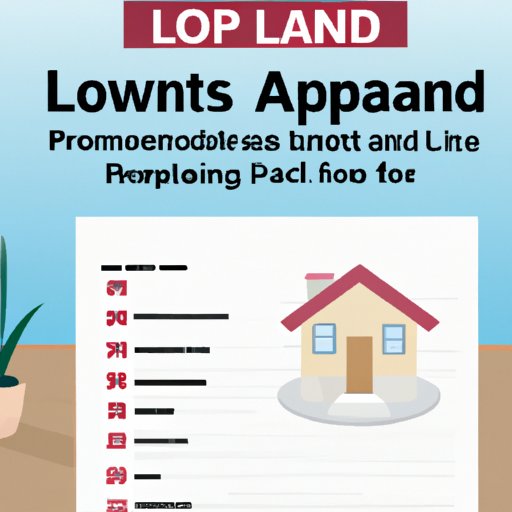Introduction
Investment property loans are mortgages secured by real estate rental properties. These loans are used to purchase or refinance rental properties, and can come in a variety of forms including traditional bank loans, government-backed programs, and private lenders. Understanding the different types of investment property loans available and the steps necessary to obtain one can be overwhelming, so this article provides a comprehensive guide to help you get started.
Research Different Loan Types
The first step in obtaining an investment property loan is to research the different loan types available and decide which one is best for you. Here are some of the most common loan types to consider:
Traditional Bank Loans
Traditional bank loans are typically the most popular option for purchasing rental properties. They offer some of the lowest interest rates, longest repayment terms, and highest loan-to-value ratios available. However, banks also often have more stringent requirements than other loan types, such as higher credit scores, larger down payments, and proof of income.
Government-Backed Programs
Government-backed programs like FHA and VA loans are another option for rental property financing. These programs are designed to help buyers with lower incomes and credit scores qualify for loans. The benefits of these programs include lower down payment requirements, easier qualification criteria, and lower interest rates. However, they may also have stricter limits on the size of the loan and require additional paperwork.
Private Lenders
Private lenders are another option for financing rental properties. These lenders usually offer shorter loan terms, higher interest rates, and lower loan-to-value ratios than traditional bank loans. Private lenders may also be more flexible in their requirements, such as accepting lower credit scores or allowing for unconventional sources of income. However, it is important to note that private lenders may also charge higher fees and require additional collateral.
Compare Rates and Fees
Once you’ve identified the type of loan that best meets your needs, the next step is to compare the rates and fees associated with each loan type. Here are some of the factors to consider when comparing investment property loans:
Interest Rates
Interest rates vary greatly between loan types, so it’s important to compare the rates offered by different lenders. It’s also important to understand how the interest rate is calculated, as some lenders may offer lower initial rates but then adjust them over time. According to a study by Freddie Mac, the average interest rate for a 30-year fixed-rate mortgage was 3.56% in December 2020.
Fees
In addition to interest rates, there are also a variety of fees associated with investment property loans. These fees can include origination fees, application fees, appraisal fees, and closing costs. Be sure to ask lenders about any additional fees they may charge before signing a loan agreement.
Gather Required Documentation
Most lenders will require certain documents before approving a loan, such as proof of income, tax returns, and a credit report. It’s important to gather all the necessary documents before applying for a loan, as lenders may not approve a loan without them. Here are some of the documents you may need to provide:
Proof of Income
Lenders will typically require proof of income before approving a loan. This can include pay stubs, W-2 forms, 1099 forms, or other documents showing your income. If you’re self-employed, you may also be asked to provide business records or tax returns.
Tax Returns
Lenders may also request copies of your recent tax returns to verify your income. Be sure to provide copies of your federal and state tax returns for the past two years.
Credit Report
Most lenders will require a credit report before approving a loan. This report will show your credit history and will help the lender determine whether you’re a good candidate for a loan. Be sure to check your credit report for any discrepancies before applying for a loan.
Check Your Credit Score
Your credit score is one of the most important factors in determining whether you’ll be approved for a loan, so it’s important to check your score before applying. Here are some tips for understanding and improving your credit score:
Understanding Your Credit Score
Your credit score is a numerical representation of your creditworthiness, based on factors such as payment history, credit utilization, and amount of debt. It’s important to understand what factors are affecting your score and how they can be improved. According to Experian, the average credit score in the United States is 711.
Improving Your Credit Score
If your credit score is lower than you’d like, there are a few steps you can take to improve it. This includes making timely payments, paying off outstanding debts, keeping balances low, and avoiding taking on new debt. It may also be helpful to review your credit report for any errors or inaccuracies.

Understand the Process of Applying for a Loan
It’s important to understand the process of applying for an investment property loan before submitting your application. Here are some of the steps involved in the loan application process:
Pre-Approval
Before submitting a formal loan application, you’ll need to get pre-approved. This involves providing your lender with basic information about yourself, such as your income level, employment history, and credit score. Your lender will then review this information and give you an estimate of the loan amount and interest rate you can expect.
Appraisals
Once you’ve been pre-approved, your lender will likely require an appraisal of the property you’re looking to purchase. An appraisal is an independent evaluation of the value of the property, and it helps the lender determine how much money they’re willing to lend. Depending on the lender, you may need to pay for the appraisal out of pocket.
Closing Costs
Closing costs are the fees associated with finalizing the loan, such as title insurance and recording fees. Closing costs typically range from 2-5% of the loan amount, so it’s important to factor them into your budget when calculating how much money you need to borrow.
Consider Working with a Financial Advisor
Working with a financial advisor can be beneficial when applying for an investment property loan. A financial advisor can help you understand the different loan types available, compare rates and fees, and evaluate whether a particular loan is right for you. Here are some tips for choosing a financial advisor:
Benefits of Working with a Financial Advisor
A financial advisor can provide valuable guidance and advice when applying for a loan. They can help you understand the different loan types available, compare rates and fees, and evaluate whether a particular loan is right for you. They can also provide advice on managing your finances and creating a plan for repaying the loan.
Questions to Ask When Choosing a Financial Advisor
When choosing a financial advisor, it’s important to ask questions to ensure they’re the right fit for you. Some questions to ask include: How long have you been in business? What services do you offer? What are your qualifications? How much do you charge? What are your areas of expertise?
Conclusion
Obtaining an investment property loan can be a complicated and overwhelming process, but it doesn’t have to be. By following the steps outlined in this article—researching different loan types, comparing rates and fees, gathering required documentation, checking your credit score, understanding the process of applying for a loan, and considering working with a financial advisor—you can make the process much smoother and increase your chances of getting approved for a loan.
(Note: Is this article not meeting your expectations? Do you have knowledge or insights to share? Unlock new opportunities and expand your reach by joining our authors team. Click Registration to join us and share your expertise with our readers.)
